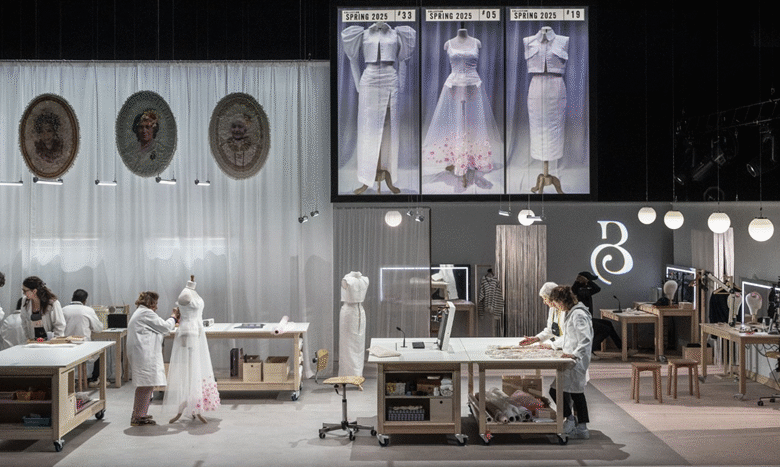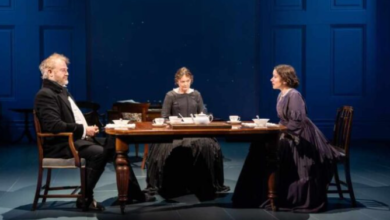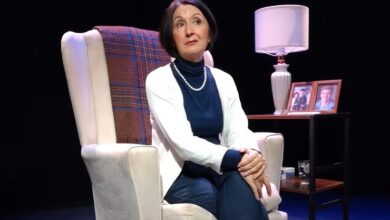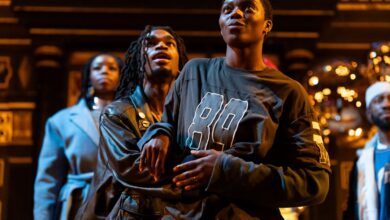Review: Lacrima, Barbican Theatre
An impressive insight into outsourced exploitation and ethics, with extravagance that veils the deepest human tragedy.Rating
Good
‘Lacrima’ is Latin for tears, and in Caroline Guiela Nguyen’s production with that name these are represented in the shape of the lace veil of an imaginary royal wedding dress. It’s a clever and complex production: an emotional journey portrayed in an intricate but rather knotty format that is, like lace, both beautiful yet difficult to work with. Ambitious stagecraft dominates, and excellent performances sit alongside taxing demands on a perhaps unknowingly active audience.
The creation of the dress focusses on Marion (Maud Le Grevellec), a hugely successful professional whose family problems surface as the project commences. But the ensuing drama more widely explores the true impact of individual choice. It encompasses the experiences of all those who have in some way touched its production – from the lacemakers of Alençon, risking blindness for their unique craft; to a haute couture Parisian fashion house, where overworked staff create exquisite garments for the elite at the expense of personal domestic stability; to the streets of Mumbai, where a lone mastercraftsman toils twice as hard for a fraction of the financial recompense, creating a masterpiece that gives reward of a different sort, but at the expense of his eyesight.
Nguyen’s direction takes a high tech, cinematic approach. It uses Alice Duchange’s sleek set design to portray the Parisian workshop, whilst offering global connections via Zoom calls and conversations on overhead displays. Streamed images and split screens describe different perspectives where characters’ remote presences nonetheless overlap in shared space. They give close up intensity to moments of drama or convey geographical and temporal shifts. A highlight is a screened countdown clock that silently reveals how Indian artisan Abdul (Charles Vinoth Irudhayaraj) works at 5am when elsewhere the others have long ago ceased.
Much of the dialogue is in spoken French with surtitles. For non-French speakers it can be difficult to simultaneously follow the actors and read, meaning we might incline to study the screen more than the onstage action. But we want to put the effort in for Art, don’t we?
Which brings us to the show’s runtime, which is 2 hours 55 minutes with a 3 minute pause. The very form of the production sets questions on how we allow others to control us. Nguyen makes the audience sit for the best part of three hours with no break, whilst a loud, often throbbing, soundtrack relentlessly pulses and tension builds relentlessly until finally the dramatic teardrop violently bursts. It’s uncomfortable, but all for the sake of Art. Is this healthy? Is it manipulative? Yet we do it. Our choice to agree echoes behaviours of complicity and passive acquiescence depicted onstage. Clever…
The play highlights masses of themes and issues, lacing them inseparably: from domestic abuse to the treatment of the mentally ill, outsourced exploitation, social inequality and the privilege of a Western world that wants everything yesterday but wants ethics too. We’re asked to consider secrecy, trust, dreams, communication; with money at the core of it all. Throughout, the overarching themes of eyesight and tears underscore the damage caused by selective blindness to the impact of our personal choices.
There’s no denying this is an impressive production with challenging, hugely valid content. But the relentless questioning, the high drama, extravagant tech and epic staging leave no moment (as characters are urged to do) to breathe, focussing clearly on the real human tragedy. The show frames Marion as a central, tragic figure, but ultimately she is perhaps instead a middle-man facilitating exploitation, and it’s Abdul’s story we really need to examine, but which is veiled in the final credits, rolling when we’re too exhausted to seek it out.
Written and Directed by Caroline Guiela Nguyen
FSL, English, Tamil Translation by Nadia Bourgeois, Carl Holland and Rajarajeswari Parisot
Artistic Collaboration: Paola Secret
Set by Alice Duchange
Costumes and high Fashion Pieces by Benjamin Moreau
Lighting by Mathilde Chamoux and Jérémie Papin
Sound by Antoine Richard and Thibaut Farineau
Musical Composition by Jean-Baptiste Cognet, Teddy Gauliat- Pitois and Antoine Richard
Video: Jérémie Scheidler
Lacrima runs at Barbican until Saturday 27 September.






